The power of evil in Boardwalk Empire
The series, produced by HBO channel, perfectly shows us the power of greed and corruption, revealing the dark side of the American dream..
22 OCTOBER 2015 · 11:00 CET
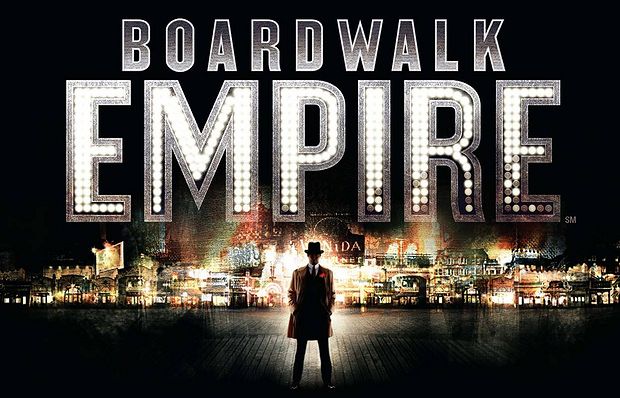
As the old saying goes, "a rotten apple spoils the barrel”. The Bible says something slightly different: “A little yeast works through the whole batch of dough.”(Galatians 5:9). The television series Boardwalk Empire, by Martin Scorsese, which has now finished and is out on DVD, is a perfect illustration of this. It shows us the power of greed and corruption, revealing the dark side of the American dream. The story by Terence Winter – the creator of The Sopranos – is set in Atlantic City in the 1920s, in the middle of the prohibition era.
The story starts on the day that the National Prohibition Act comes into force, on 16 January 1920. Just before, the politician Enoch Nucky Thompson – played by the always effective Steve Busceni, portraying a strange protagonist, half irritating, half fascinating – contacts the Woman’s Christian Temperance Union, one of the groups that grew out of the Protestant movement and that started denouncing alcohol-serving establishment in 1895. The surprise comes when that same man, the city’s treasurer, then goes on to throw a party to celebrate the Prohibition, in anticipation of all the money he is going to make out of the Act. It is the beginning of organized crime, which we know so much about from mafia stories.
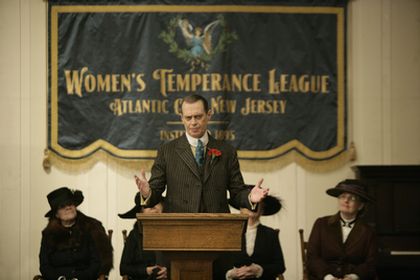
Thompson is not a gangster – according to Scorsese –, but a corrupt man, who is prepared to profit from importing liquor to Atlantic City. The story is based on Nucky Johnson, the real person who pulled the strings in that community, where his bother was the sheriff. As with many politicians, he is capable of anything to keep hold of power. Around him, we find real life people like Arnold Rothstein, Charlie Lucky Luciano and Al Capone, not as we think of them today, but at the time when the mafia’s activities were just getting started – as recounted in the book by Nelson Johnson –.
The Jewish gangster, Rothstein, is a gambler, who starts to traffic drugs and alcohol; Luciano is a Sicilian immigrant at his service; and the British actor Stephan Graham plays the young Capone, achieving a remarkable resemblance to him. We have never seen Capone like this, before his life in the Chicago mafia, working as driver and bodyguard to Johnny Torrio. We see him at home with his wife and son; a man capable of both kindness and cruelty, who enjoys playing the mandolin. According to his biographer, this is the best screen portrayal of Capone yet.
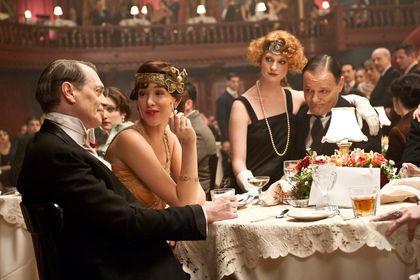
TURBULENT 1920s
Boardwalk Empire presents us with a multifaceted picture of the United States at that time, from the perspectives of politics, religion and crime, shedding light on the origins of the feminist movement and racial and ethnic conflicts. We meet the homeless heroes of the First World War, foreshadowing the Vietnam veterans of the films of the 1970s – a decade represented in the series’ soundtrack–. While the police fight those who violate the Act, the main characters are the ones who are really in control behind the scenes, over and above the police.
Although the series has been compared to The Sopranos – being about gangsters and written by the same screenwriters –, it is closer to other HBO productions, such as the western-style series, “Deadwood”, or even the legendary “The Wire”. In this regard, Thompson is an ambiguous hero, who has the potential for both good and evil – just like the main character in Deadwood, by David Wilch–, but consumed by corruption – as in Baltimore, by David Simon–.
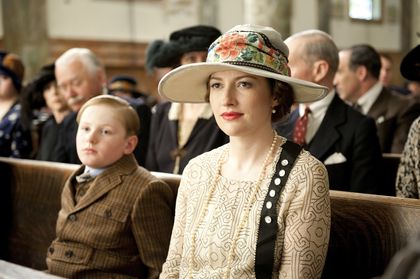
The Prohibition agent, Van Alden, is a religious man. He believes that he has a God-given mission to fight moral corruption, which he abhors on spiritual grounds. He flagellates himself but his fanaticism is as blind as that of the Christians driving the Prohibition Act. The Prohibition Party was created in 1869 by a group of white Protestants. Their motives were admirable, but the 25 years of campaigning that led to the Prohibition were totally counter-productive. They aggravated alcohol abuse, which increased with the illegal trade of bootleggers working through clandestine bars known as “speakeasies”. The Act was eventually abolished by President Roosevelt in 1933.
MORALISM AND THE GOSPEL
Then, as now, Christians continue with their campaigning mentality, thinking that they can improve society by imposing moral rules according to God’s will, as if laws were capable of changing man. The truth, however, is that only God’s Spirit can teach us to live in a way that pleases Him. It isn’t therefore morality that makes us live as Christians, but the opposite. It is by being born again and receiving the Holy Spirit (John 3), that we are able to live differently.
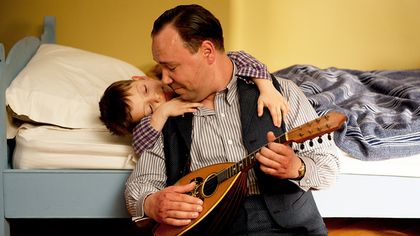
Many Christians, however, fear the message of grace because they think that it is counterproductive in a permissive society that has turned its back on God and His laws. They tell us that in today’s world the problem is no longer phariseeism and moralism, but the break with any kind of rule, bringing us under the judgement of God. The thing is that it is God himself who shows us how to distinguish the Gospel from mere moralism. The apostolic answer to those who live in contradiction with the will of God is not the law, but grace (Romans 6:1-4).
The only way we can obey God is because God accepts us radically and unconditionally, despite our sinful state. The power that saves us from corruption is the Gospel (1:16), not the power of the law (7:13-24). It is God’s goodness that leads us to repent (Romans 2:4). Both the Bible and our own daily experience show us that where we go wrong is not in relying on grace, but when we fail to take it into consideration (6:1). That is why we need to talk, not less, but more of the free grace of God, who takes us as we are, in Jesus Christ
Published in: Evangelical Focus - Between the Lines - The power of evil in Boardwalk Empire
